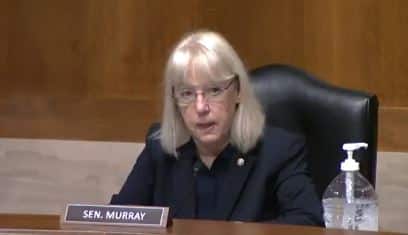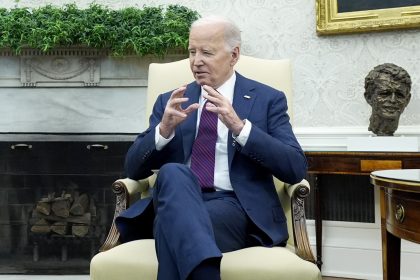Tribal Communities Have ‘Worst of Both Worlds’ in Pandemic

A recent Harvard study found that when it came to the combined economic and health impacts of the coronavirus pandemic, tribal communities “are having the worst of both worlds at the same time.”
On Thursday, the Senate Health, Education, Labor and Pensions Committee grappled with how to get its arms around the issue, and similar challenges faced by all people of color since the pandemic began a year ago.
“When we talk about inequities, we are talking about the reality that people’s health suffers because of systemic issues like how far they are from quality, affordable, accessible, culturally competent care; whether they are recruited for clinical trials or the health care workforce; and issues including ‘social determinants of health’—things like where people are born, live, and work,” said Committee Chair Patty Murray, D-Wash., at the start of the hearing.
In her opening remarks, Murray also spoke about the need for better demographic data, something she has pushed to improve throughout the COVID-19 pandemic. She also highlighted some of the recent steps the Biden Administration has taken to address disparities, including its announcement of a $10 billion investment in funding from the American Rescue Plan to expand vaccine access and build vaccine confidence in underserved communities.
“The reality of health inequities is that how you live, and even whether you live or die in a pandemic, is impacted by your race, your income, your zip code, your disability, your gender identity, your sexual orientation, and these factors intersect in ways that compound injustice if you are, for example, a woman of color, or a person with a low income and a disability,” she said.
“Now the COVID-19 pandemic has deepened these inequities to devastating effect, and made it even more urgent we look at how we got to this awful point—and what to do,” Murray said.
But it quickly became evident the challenges are many and long lasting solutions are difficult to identify.
If there was a consensus on the Senate panel, it was that COVID-19 infections, hospitalizations, and deaths are disproportionately high for Black, Latino, and Tribal communities.
At the same time, there was general agreement that these communities have had less access to tests, therapeutics and vaccines than the population as a whole.
But there was far less agreement on why that is, with some lawmakers on the panel suggesting it was the reluctance of members of these communities themselves to get treatment or vaccinations that made their COVID numbers soar.
Among those who addressed the panel Thursday was Abigail Echo-Hawk, executive vice president of the Seattle Indian Health Board.
She said at least 75% of the Native Americans she works with on a regular basis have said they would readily take the vaccine, but that they’ve had a tough time overcoming barriers, such as a lack of transportation to a vaccination site.
Other challenges — some of them entirely bureaucratic — have also contributed to a slow response to the crisis in Native American communities.
“We asked for PPE for the Tribe, and we were sent body bags,” Echo-Hawk said.
She also noted that there’s a lack of information-sharing between Tribal and other medical facilities.
Asked about the other 25% of Native Americans she works with, those that have expressed some reluctance to seek treatment or take the vaccine, Echo-Hawk said the absence of broadband access in many Tribal and rural communities has greatly hampered educating the public about the vaccine.
Making matters worse, she said, those who do have some internet access are often picking up and sharing misinformation they’ve gathered through social media.
Bill Cassidy, R-La., wondered how many Native Americans and other people of color are avoiding the vaccine as a direct result of the disconnect from reliable information.
Kekoa Lopez- Paguyo, a community health worker for a Native Hawaiian and Pacific Islander pandemic response team in California said, in his experience, when the facts about the COVID vaccine are explained to a Native Hawaiian or Pacific Islander, they are more likely to want to be vaccinated.
He is one of many community health workers filling in the gaps in vaccine knowledge in communities that often lack federally qualified health centers.
Besides communicating information, both Murray and Lopez- Paguyo said it’s vitally important that healthcare workers and municipalities on the front line continue to collect data about the communities they are serving — data that can be used to better identify underserved communities and tailor outreach to them.
Murray pointed out that the recently passed $1.9 trillion COVID relief package, known as the American Rescue Plan, includes provisions for telemedicine programs and vaccination sites for underserved communities and more.
But some panelists were less than impressed, noting, for instance, that telemedicine programs are all well and good, but only if one has the broadband access necessary to use them.
























